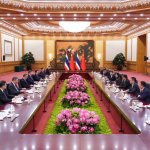
Thai Prime Minister Prayut Chan-o-cha ordered state agencies and departments to “take action against individuals spreading fake news about COVID-19, which might cause public confusion during the pandemic.” The government claims that the harsh edict came in response to social media rumors that the Bang Sue vaccination center in Bangkok would be shut down due to overcrowding. Prayut ordered ministries to establish individual task forces to “check and correct fake news” that is centered around their own responsibility.
The Government’s Anti-Fake News Centre, which was established in November 2019, has been ordered to check and verify information. The decree by the Prayut government is another attempt to impugn and crackdown on news organizations for what it has deemed to be information that is injurious to national security. Police Gen. Suwat Jangyodsuk, following the order, instructed all the police to work with the Ministry of Digital Economy and Society (MDES) and other agencies to “monitor fake news and identify, track down and arrest perpetrators.”
While that information was typically of the kind critical of the military-backed government, the military, yesterday’s decree expands that to include the propagation of information that frightens people or “intentionally distorting information to cause a misunderstanding of the emergency situation, which may eventually affect state security, order, or good morality of the people.”

In the past, the MDES has been vague about the definition of fake news, simply describing it as “any viral content online that misleads people or damages the country’s image.” The new order, which was issued under the emergency decree and published in the Royal Gazette, empowers the National Broadcasting and Telecommunications Commission (NBTC) to notify internet providers to check which IP address the information came from and to block the internet access of the end user.
Offenders will be referred to the police for legal action.
Prayut has long sought to renew the government’s war on what they refer to as fake news. In June, Prayut called on MDES, the Ministry of Justice and the Thai police to take legal action against those it believed were circulating false information. Prayut also went as far as to begin examining the laws of foreign countries to help Thailand counter the spread. While the search for relevant laws continues, the new decree accelerates the regime’s curbs on freedom of expression and freedom of the press. While in the past, it had difficulty going after the ability of the user to post information on social media, as well as prosecute social media companies, this time the decree quickens the censorship process by targeting the user’s internet access—and consequently their social media access. IP addresses are often assigned to users through a provider or a range of IPs, all of which can be traced.
Prayut also now has increased legal standing to target celebrities that have been more vocal in their criticism of the government. Recently, Prayut took legal action against 18-year-old rapper Danupa “Milli” Kanaterrakul, after she tweeted in June about the Prime Minister’s handling of the COVID-19 pandemic.
The new decree could cast a pall over social media criticism by celebrities, who have been increasingly concerned about Thailand’s worsening COVID crisis and have encouraged people to demand better medical treatment. Prayut was quick to note that “celebrities, media outlets or owners of popular Facebook pages” would be brought up on charges if they violated the laws. Six Thai media organizations later issued a joint statement condemning Prayut’s order to prosecute journalists, media organizations and celebrities suspected of spreading fake news.
Critics have long believed that the Royal Decree on Public Administration in Emergency Situations gives too much authority to the government to restrict freedom of speech and the press, particularly under Section 9. Earlier this month, regulation No. 27 prohibited the dissemination of news and set criminal charges for up to 2 years and a fine of 40,000 baht. Since 2020, 28 regulations have been announced by the government which give Thai authorities increased power to crackdown on free speech. Included are street protests, which have been viewed by the government as compounding the spread of the coronavirus pandemic.
Fears for journalists and news organizations are real and the consequences of the new decree can be existential. News organizations must now navigate—not only a vaguely worded definition of what is considered fake news—but a hostile regulatory environment where an array of agencies could be actively targeting them in a bid to silence legitimate critique of the government’s handling of the COVID-19 pandemic. Thai journalists, who often work long hours for low pay, could be swayed by the possibility of a lengthy prison term and a substantial fine. Self-censorship among journalists, already a problem in Thailand, is likely to increase.
Most worrisome for news editors is the second guessing that might accompany editorial decision-making on pandemic-related news or information that is critical of the government. A severe consequence is that the government clearly wants to silence and penalize any news organization or journalist that publishes information that runs contrary to the government’s sensibilities—even if the information has been verified and deemed wholly accurate.
In the age of social media, where information between individuals is exchanged in mere seconds, popular applications like LINE, WhatsApp, and other platforms might also come under fire. In the past, the government had made threats to social media giants Facebook and Google, now it could go the way of Nigeria, which blocked Twitter on the same pretext—that “misinformation” and “fake news” have had “real world violent consequences.” The move by the Thai government could also trigger a wave of legal challenges.
The new decree has dire ramifications for all Thais. Even if Thai people share legitimate information, even second hand, the government could still determine that the information, while factual, could cause a panic. The government has almost accomplished what it has long set out to achieve. It’s a giant step closer to being the sole arbiter of what is true and what is fake.






